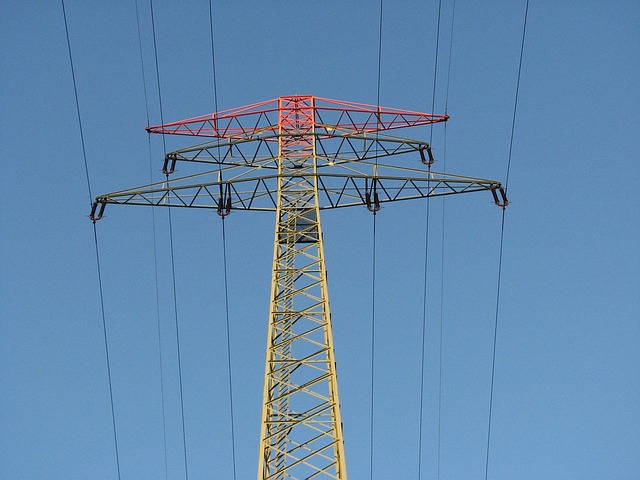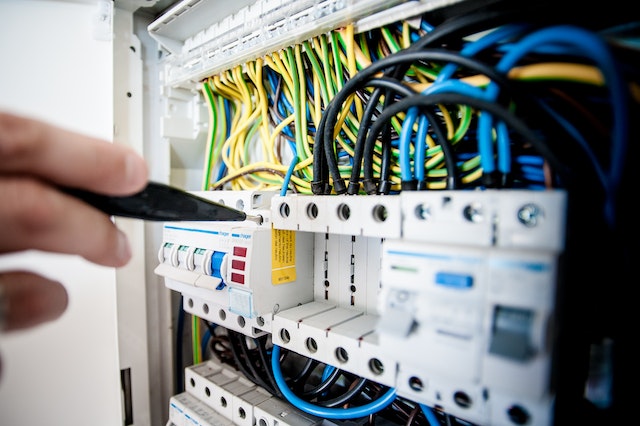Internet connectivity serves as a powerful tool in empowering energy management practices, revolutionizing the way we generate, distribute, and consume electricity. Through the integration of smart grid technology and efficient energy management strategies, we can optimize energy usage, enhance reliability, and incorporate renewable energy sources. With the help of internet connectivity, energy management becomes more seamless and effective. The real-time data exchange, remote monitoring, and control enabled by internet connectivity empower us to make informed decisions and take proactive measures to conserve energy. Internet connectivity acts as the driving force behind the integration and operation of smart grid and energy management systems, ensuring efficient energy utilization and a sustainable future.
Definition of Smart Grid and Energy Management: Understanding the Role of Internet in Empowering Energy Management
Smart grid encompasses an intelligent electricity network that integrates communication, sensing, and control technologies to optimize the generation, transmission, and distribution of power. It enables two-way communication between power producers, grid operators, and consumers, facilitating real-time data exchange and decision-making. Internet Empowering Energy Management, on the other hand, refers to the application of techniques and tools to effectively monitor, control, and conserve energy resources. It involves analysing energy consumption patterns, implementing demand response strategies, and optimizing energy usage to achieve efficiency and sustainability goals.
Importance of Internet Connectivity in the context of Smart Grid and Energy Management
Internet connectivity serves as the backbone of a smart grid and energy management infrastructure. It provides necessary communication channels for data exchange and control operations. Without internet connectivity, the full potential of smart grid technology cannot be realized. Here are key reasons why internet connectivity is crucial:
- Real-time Data Exchange: Internet connectivity enables real-time data collection, transmission, and analysis. This data is sourced from smart meters, sensors, and internet empowering energy management systems in the grid. It empowers grid operators to make informed decisions, detect abnormalities, and respond swiftly to changing energy demands.
- Remote Monitoring and Control: Internet connectivity enables remote monitoring and control of energy infrastructure. This includes substations, distribution networks, and renewable energy installations. All in all, it enhances operational efficiency, improves grid reliability, and enables prompt responses to faults or outages.
- Integration of Distributed Energy Resources: Internet connectivity facilitates the integration of distributed energy resources like solar panels and wind turbines into the grid. Moreover, it enables real-time monitoring and control of these resources, ensuring grid stability.
- Demand Response and Load Management: Internet connectivity supports effective demand response programs, allowing consumers to adjust energy usage based on real-time price signals or grid conditions. It also enables automated load shedding and load balancing techniques, managing peak demand and optimizing energy consumption.
- Enhanced Energy Efficiency: Internet connectivity provides access to real-time energy consumption data, empowering consumers to monitor and manage usage effectively. Smart meters and energy management systems help identify wasteful energy practices, implement energy-saving measures, and reduce overall consumption.
Enhanced Monitoring and Control
Internet connectivity plays a vital role in enhancing the efficiency, reliability, and stability of smart grid and energy management systems. By enabling real-time data collection, remote monitoring, and control of energy infrastructure, internet connectivity revolutionizes the way we manage and optimize our electrical grids.
Real-time Data Collection and Analysis: Internet’s Role in Empowering Energy Management
Additionally, real-time data collection allows for the continuous monitoring of various components within the smart grid system. Internet connectivity facilitates the seamless transmission of data from smart meters, sensors, and other grid devices. This data, collected in real-time, provides valuable insights into energy consumption patterns, grid performance, and potential faults or abnormalities. Through advanced analytics, grid operators can promptly detect anomalies, make informed decisions, and take preventive actions to ensure optimal grid operation.
Remote Monitoring and Control of Energy Infrastructure
Accordingly, internet connectivity enables remote monitoring and control of energy infrastructure, eliminating the need for manual interventions and reducing response time. On the other hand, grid operators can remotely access and monitor substations, distribution networks, and renewable energy installations. With real-time visibility into grid performance, they can identify potential issues, perform diagnostics, and implement control measures to maintain the smooth operation of the grid. This capability enhances operational efficiency and reduces the need for physical inspections and on-site interventions.
Improved Grid Reliability and Stability: Internet’s Impact on Energy Management for Enhanced Reliability
With internet connectivity, smart grids can achieve improved reliability and stability. Real-time data collection and analysis enable grid operators to detect and address problems proactively. By identifying potential faults or issues before they escalate, operators can mitigate the impact on grid performance and prevent widespread outages. The ability to remotely monitor and control energy infrastructure ensures swift responses to faults, enabling faster restoration of service and minimizing downtime. Overall, these capabilities enhance the resilience of the grid, ensuring a reliable and stable energy supply to consumers.
Demand Response and Load Management
Internet connectivity plays a pivotal role in enabling efficient demand monitoring, load management, and energy optimization within smart grid systems. By providing real-time insights and enabling automated control mechanisms, internet connectivity revolutionizes the way we manage energy demand and ensure optimal utilization of resources.
Real-time Demand Monitoring and Forecasting
With internet connectivity, smart grid systems can continuously monitor and forecast energy demand in real-time. This enables grid operators to accurately anticipate fluctuations in energy consumption and adjust supply accordingly. Real-time demand monitoring helps identify peak demand periods, allowing for proactive measures to be taken to prevent grid overload and potential disruptions. By staying ahead of changing demand patterns, grid operators can optimize energy generation and distribution, resulting in efficient resource allocation.
Automated Load Shedding and Load Balancing: How Internet Empowers Energy Management Efficiency
Internet connectivity facilitates automated load shedding and load balancing techniques within smart grids. When the demand exceeds supply or reaches critical levels, intelligent algorithms can automatically shed non-essential loads to prevent grid instability. Load balancing mechanisms redistribute the energy load across different parts of the grid, ensuring that no individual component is overburdened. By automating these processes, grid operators can swiftly and optimally respond to changing demand scenarios, maintaining grid stability and preventing widespread outages.
Peak Load Management and Energy Optimization: Internet Empowering Energy Management for Peak Efficiency
Peak load management is crucial for maintaining grid stability and reducing strain on energy resources. Internet connectivity allows smart grids to effectively manage peak demand periods by implementing demand response strategies. By providing real-time information and incentives to consumers, such as time-based pricing or load control programs, peak demand can be shifted to off-peak hours, reducing the strain on the grid during critical periods. Additionally, internet connectivity enables energy optimization through advanced analytics and control algorithms. Real-time data analysis helps identify energy wastage, optimize energy usage patterns, and promote energy-saving practices.
Integration of Renewable Energy Sources
Internet connectivity plays a crucial role in enabling real-time monitoring, efficient integration, and enhanced utilization of distributed energy resources within smart grid systems. By providing seamless communication and control, internet connectivity unlocks the potential of renewable energy sources, such as solar, wind, and other renewables, and contributes to grid stability and sustainability.
Real-time Monitoring and Control of Distributed Energy Resources
Internet connectivity enables real-time monitoring and control of distributed energy resources, such as solar panels and wind turbines. Through continuous data exchange, grid operators can monitor the performance, output, and condition of these resources in real-time. This information allows for proactive maintenance, prompt identification of issues, and swift responses to optimize energy generation and maximize the utilization of renewable sources.
Efficient Integration of Solar, Wind, and Other Renewables: Leveraging Internet for Empowered Energy Management
With internet connectivity, smart grids can efficiently integrate and manage the variability of solar, wind, and other renewable energy sources. Accordingly, real-time data collection and analysis enable grid operators to assess the availability and potential generation of these resources. This information helps optimize the integration of renewable energy into the grid, ensuring a balanced and reliable energy supply. Smart algorithms can dynamically adjust energy distribution based on real-time renewable energy availability, reducing reliance on traditional power sources and promoting a cleaner and more sustainable energy mix.
Enhanced Grid Stability and Renewable Energy Utilization: Internet’s Role in Empowering Energy Management
Internet connectivity enhances grid stability by enabling better management of distributed energy resources and renewable energy utilization. Moreover, real-time monitoring allows for the detection of any fluctuations or imbalances in energy supply and demand. As a result, grid operators can promptly respond by adjusting power generation or redistributing energy flow to maintain grid stability. By effectively utilizing renewable energy sources, internet-enabled smart grids contribute to reducing carbon emissions, promoting environmental sustainability, and achieving energy targets.
Energy Efficiency and Conservation
Internet connectivity plays a critical role in providing access to real-time energy consumption data, enabling the implementation of smart meters and energy management systems. By empowering consumers with information and optimizing energy usage patterns, internet connectivity contributes to more efficient and sustainable energy consumption.
Access to Real-time Energy Consumption Data: Internet’s Impact on Real-time Energy Management
Internet connectivity allows consumers to access real-time energy consumption data, providing them with valuable insights into their energy usage. Therefore, with the help of smart meters and connected devices, consumers can monitor their energy consumption patterns and track usage trends. Real-time data empowers them to make informed decisions regarding their energy consumption, promoting awareness and encouraging more efficient energy usage.
Smart Meters and Internet Empowering Energy Management Systems
Smart meters, enabled by internet connectivity, revolutionize the way energy is measured and managed. These advanced devices collect energy usage data at regular intervals and transmit it wirelessly to utilities and consumers. By accurately measuring and recording energy consumption, smart meters enable more precise billing and facilitate demand response programs. Additionally, integrated internet empowering energy management systems can analyse the collected data and provide valuable insights for optimizing energy usage.
Optimal Energy Usage Patterns and Reduction of Wastage: Internet Empowering Energy Management for Optimal Efficiency
Besides, with real-time energy consumption data and internet empowering energy management systems, consumers can identify and adopt optimal energy usage patterns. They understand their consumption habits and make informed choices to reduce wastage. Aligning energy usage with periods of lower demand or renewable energy availability becomes possible. Internet connectivity enables automated energy-saving features and alerts, reducing unnecessary energy usage and lowering carbon footprint.
Fault Detection and Diagnostics
Internet connectivity plays a crucial role in the early detection of system faults and abnormalities, enabling remote diagnostics and troubleshooting within smart grid and energy management systems. By facilitating swift responses to issues, internet connectivity minimizes downtime and enhances the overall reliability of the energy infrastructure.
Early Detection of System Faults and Abnormalities: How Internet Empowers Energy Management Monitoring
Internet connectivity allows for real-time monitoring of smart grid systems, enabling the early detection of faults and abnormalities. As a result, through continuous data exchange, grid operators can receive instant notifications and alerts regarding potential system malfunctions. Moreover, this early detection helps prevent minor issues from escalating into major problems and allows for prompt actions to be taken to rectify the situation.
Remote Diagnostics and Troubleshooting: Internet’s Empowering Role in Energy Management
Additionally, with internet connectivity, remote diagnostics and troubleshooting become possible within smart grid systems. For instance, grid operators can remotely access and analyse data from various components of the grid, such as sensors, meters, and control systems. This remote access enables them to diagnose issues, identify the root causes of faults, and initiate appropriate remedial measures without the need for physical intervention.
Minimization of Downtime and Faster Response to Outages
Internet connectivity facilitates faster responses to outages by enabling immediate remote access to affected areas of the grid. Grid operators can quickly pinpoint the source of the outage, assess the extent of the problem, and deploy resources more efficiently. Internet connectivity reduces response time and minimizes downtime. This contributes to improved customer satisfaction, as well as economic and operational benefits.
Scalability and Flexibility
Internet connectivity empowers smart grids and energy management systems to accommodate growing energy demands, integrate new technologies, and adapt to the changing energy landscape. Moreover, by providing the foundation for innovation and flexibility, internet connectivity ensures a robust and future-proof energy infrastructure.
Ability to Accommodate Growing Energy Demands: Internet’s Role in Empowering Energy Management
Internet connectivity enables smart grids to handle the ever-increasing energy demands of modern society. In fact, by facilitating real-time monitoring and control, it allows grid operators to optimize energy generation, distribution, and consumption. This capability ensures the energy infrastructure can adapt and scale. It meets the growing needs of residential, commercial, and industrial sectors.
Integration of New Technologies and Energy Solutions: Leveraging Internet for Empowered Energy Management
Additionally, with internet connectivity, smart grids can seamlessly integrate new technologies and energy solutions. Furthermore, advanced sensors, smart meters, and IoT devices can be interconnected to collect and exchange data, enabling more precise monitoring and control of energy systems. This integration promotes the adoption of renewable energy sources, energy storage solutions, and electric vehicle charging infrastructure. In summary, internet connectivity serves as the backbone for these interconnected systems, facilitating their seamless operation and coordination.
Adaptability to Changing Energy Landscape and Future Advancements
Internet connectivity equips smart grids with the flexibility to adapt to the changing energy landscape and embrace future advancements. Naturally, as new energy technologies and solutions emerge, smart grids can evolve and incorporate them into the existing infrastructure. The connectivity allows for the rapid deployment and integration of innovative solutions, such as microgrids, demand response programs, and internet empowering energy management platforms. This adaptability ensures that the energy infrastructure remains resilient, efficient, and capable of meeting future energy needs.
Cost Savings and Economic Benefits
Internet connectivity offers numerous benefits for smart grids and energy management systems. Finally, these include reducing operational and maintenance costs, increasing energy efficiency to lower consumer bills, and creating new job opportunities and driving economic growth.
Reduction in Operational and Maintenance Costs: Internet’s Impact on Energy Management Efficiency
Additionally, internet connectivity allows for remote monitoring, control, and diagnostics of energy systems, leading to a reduction in operational and maintenance costs. As a result, grid operators can remotely assess the performance and health of equipment, detect faults or inefficiencies, and implement timely maintenance actions. Moreover, this proactive approach minimizes downtime, optimizes maintenance schedules, and reduces the need for costly on-site visits.
Increased Energy Efficiency Leading to Lower Bills for Consumers
Internet connectivity empowers consumers to monitor and manage their energy consumption. This leads to increased energy efficiency and lower bills. Real-time access to energy usage data enables consumers to identify wasteful habits and make informed decisions. They can optimize energy usage by adjusting settings, scheduling tasks during off-peak hours, and adopting energy-saving practices. These actions contribute to reduced energy consumption and lower utility bills.
Creation of New Job Opportunities and Economic Growth: Harnessing Internet’s Power for Energy Management
The integration of internet connectivity into smart grid systems creates new job opportunities and fuels economic growth. It fosters the development of a skilled workforce in areas such as data analytics, cybersecurity, and energy management. Moreover, the deployment of smart grid technologies stimulates the growth of the renewable energy sector, leading to job creation in fields like solar and wind energy. This not only enhances the local economy but also drives innovation and attracts investment in the energy sector.
Conclusion
To summarise, internet connectivity plays a crucial role in revolutionizing smart grids and energy management systems, offering numerous benefits such as real-time monitoring, increased efficiency, and improved reliability. However, to fully realize these advantages, continued investment in infrastructure and technology is essential for creating a sustainable, reliable, and efficient energy future.
Recap of the Benefits of Internet Connectivity: How Internet Empowers Energy Management
Internet connectivity empowers real-time monitoring and control, enabling early detection of faults, efficient integration of renewable energy sources, and optimal energy management. As a result, it provides access to valuable data for demand monitoring, load balancing, and grid stability. Internet connectivity also facilitates remote diagnostics and troubleshooting, reducing downtime and enhancing the overall reliability of the energy infrastructure.
Importance of Continued Investment in Infrastructure and Technology
Additionally, to harness the full potential of internet connectivity, continued investment in infrastructure and technology is crucial. Upgrading and expanding the grid infrastructure to accommodate the increasing energy demands and integrate new technologies are essential steps. As a result, investment in smart meters, advanced sensors, and communication networks ensures seamless data exchange and enhances system efficiency. Cybersecurity measures are equally important to safeguard the interconnected energy systems from potential threats.
Potential for a Sustainable, Reliable, and Efficient Energy Future: Internet’s Role in Empowering Energy Management
With sustained investment in infrastructure and technology, there is vast potential for achieving a sustainable, reliable, and efficient energy future. Internet-connected smart grids can optimize energy generation, distribution, and consumption, reducing environmental impact and lowering costs for consumers. The integration of renewable energy sources and the adoption of energy-efficient practices contribute to a cleaner and greener energy ecosystem. In summary, by leveraging the benefits of internet connectivity, we can pave the way for a resilient energy future that meets the evolving needs of society.
In conclusion, internet connectivity is vital for unlocking the benefits of smart grids and energy management systems. Continued investment in infrastructure and technology is necessary to fully realize its potential. This will help create a sustainable, reliable, and efficient energy future. All in all, by embracing this vision and making strategic investments, we can build a resilient energy ecosystem that meets the demands of a rapidly changing world.












